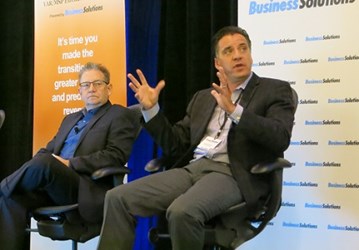How To Go From One-Man Shop To MSP

By Christine Kern, contributing writer

Wondering how to take the next step from a one-man shop to a managed services provider (MSP)? Panelists at Channel Transitions VAR/MSP Executive Conference, powered by Business Solutions, on Sept. 24 at the DoubleTree Chicago-Downers Grove, shared advice on the topic.
Panelist Karl Palachuk owner of Small Biz Thoughts and author of author of 15 books, including Managed Services in a Month and the four-volume Managed Services Operations Manual, said, “My first recommendation is that your first hire should be an administrative assistant and not a technician. An administrative assistant will allow you to offload billing, invoicing, and chasing things down, Look at what you do in a week — there’s so much stuff that has nothing to do with technology. It has to do with business.” He said if you pass that work to an administrative assistant, you will have extra time in your schedule to deliver tech support and earn more money. “Then, when you’re ready to do the next hire, make that a technician — and make sure that you hire them by the hour and don’t commit to $40,000 a year,” Palachuk advised.
Panelists David DeCamillis, VP of sales and marketing at Platte River Networks, advised, “If you’re small, you probably want to hire a salesperson that can wear a few hats — like a sales engineer. But, it’s so hard to find good salespeople. You’re the face of the company, you’re out there. Once you get to the point where you’re big enough that you need it, that’s when you start hiring sales people.”
Palachuk said, “Most sole proprietors are probably better off hiring a technician to deliver most of their services because, you as the owner, really are going to be the best salesperson for a long, long time.”
Beyond hiring, DeCamillis offered additional advice for MSP beginners: “Start small. Only have one or two (managed service) products and then bundle. Maybe just start with spam filtering, email, or continuity — but just don’t take it all on at once.” He also stressed the importance of your choices in vendor partners. “There are good vendors out there that have good support, they’ll help you,” he commented.
“And don’t be afraid to say no,” cautioned Palachuk. “You don’t have to take every customer. It’s not worth it.” Palachuk, who was the keynote speaker for Channel Transitions, was also the keynote at Business Solutions’ Retail IT VAR Of The Future conference earlier this year, where he explained how clients factor into your success. “Some people don’t believe in preventive maintenance. You have to accept that those people won’t be your clients,” he pointed out.
Palachuk suggested running a sales report from the past 12 months and looking at which companies spent the most money with you. He said these businesses have the highest probability of becoming managed services clients. Conversely, those listed at the bottom, the companies that spent, perhaps, $100 last year, are “just customers, not clients. They are casual acquaintances who just happen to have your phone number. You have to decide if you want to continue to do business with them,” he said.
For more information on the Channel Transitions VAR/MSP Executive Conference, visit www.ChannelTransitions.comor email Events@BSMinfo.com. Channel Transitions will also be held on November 5 in Orlando, FL.
Channel Transitions is sponsored by platinum sponsors MAXfocus, and Worldpay, gold sponsors Harbortouch and Webroot, and networking sponsors Great America, Mercury, and Moneris, along with industry association partners CompTIA, The ASCII Group, and the Retail Solutions Providers Association (RSPA).
